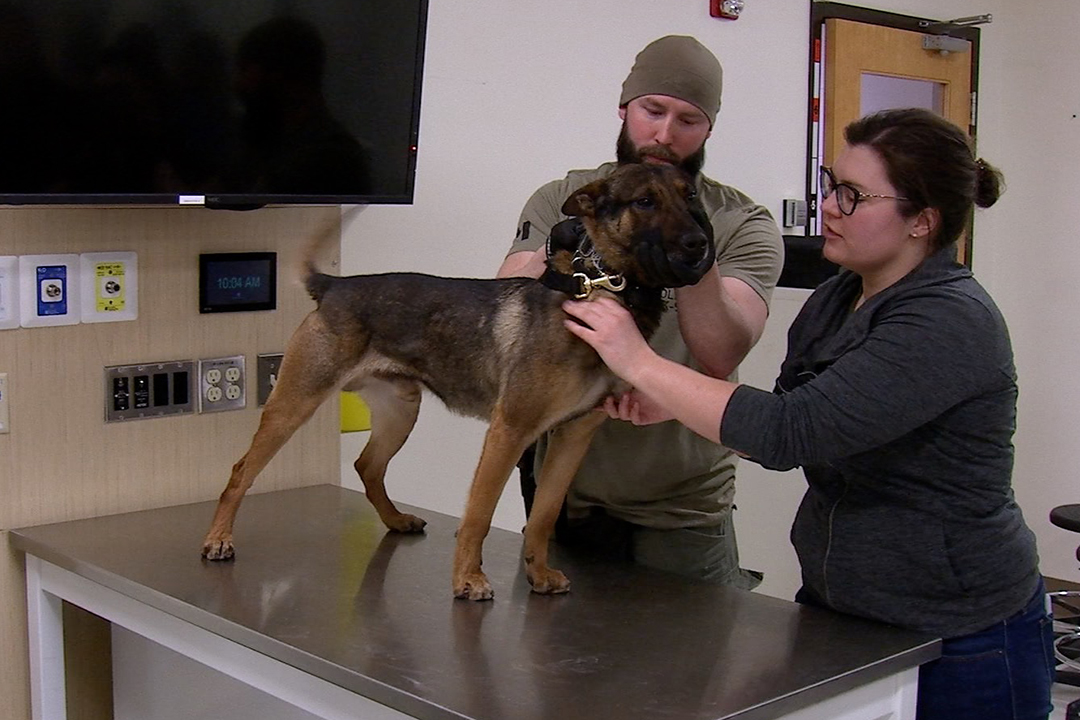
USask vet hospital’s training day highlights health of canine cops
Committed to a life of fighting crime, a group of dogs at the Saskatoon Police Service (SPS) is anything but ordinary.
By Tyler Schroeder“We often relate them to high-end athletes,” says Sgt. Cory Goodwin of the SPS Canine Unit, describing the drive and abilities of the four-legged police officers in the city’s service.
“They could be facing a life-ending injury, and they would behave like it’s a normal working day,” adds Goodwin, who has led the SPS’s canine unit since 2019.
Ears, eyes, mouth and nose — the 10 dogs that make up the unit rely on these organs and their senses to assist their handlers in law enforcement. Tasked with a variety of duties including human tracking and narcotic detection, the physically demanding nature of the dogs’ work increases the importance of regular health check-ups and exams.
“It could be something very simple — like an ear infection or an eye infection — right up to extreme trauma, such as a dog being shot or stabbed, which we've unfortunately seen in recent years,” says Goodwin, pointing out that police dogs face the same high risks on patrol as human officers do during their shifts.
In March 2023 the WCVM’s Veterinary Medical Centre (VMC) hosted the SPS canine unit for a health-focused training day, providing handlers with insight and knowledge they can use for regular assessments of their dogs’ well-being.
The day’s instructors were Dr. Jordan Woodsworth, a wellness veterinarian at the VMC, and Dr. Jennifer Loewen, a specialist in critical care and emergency at the hospital. Woodsworth, the VMC’s regular medical contact for the canine unit, says initiatives like the training day highlight the strong connection between the SPS and the WCVM’s veterinary teaching hospital.
“We need to have a relationship with the Saskatoon police because if something bad were to happen to one of their dogs while they're in the field, this is where they're going to come,” says Woodsworth.
“For us to know their dogs, to have a relationship with the handlers, and to know the dog's health status leading up to any sort of emergency event really helps us to be able to appropriately care for those dogs when something happens.”
The college’s VMC has provided veterinary services for the SPS canine unit for over five years, with each dog receiving bi-annual checkups in the VMC’s Small Animal Clinic. While these regular check-ups benefit the dogs, they also allow veterinary students to gain vital hands-on experience with a unique group of service animals.
“I think most of our students are accustomed to seeing the average pet that stays in the house most of the day. They don't get a lot of exposure to operational dogs, whether those are military [dogs], hunting dogs, or in this case, police dogs,” says Woodsworth.
“It's really good for them to think about what are the things that are different about these dogs in terms of the stuff that that we need to pay attention to.”
The day’s schedule included training on a wide variety of dog assessment information, starting with standard physical evaluations. With this training, handlers are better equipped to assess the daily health needs of their dogs.
“We did an overview of nose-to-tail assessments [on the dogs]: how to look at their face, how to look at their eyes, their ears, their teeth ... their gums, their circulation, their skin, listening to their heart and checking their heart rate,” says Woodsworth.
“Teeth are important for every dog, but these dogs use their teeth for their work. They also use their nose for their work. Many of them are drug sniffers or they do some explosives detection work … for them to be able to use their noses is really important.”
The day also involved training on traumatic situational response including emergency transport, gun-shot wounds, stabbing, heat exhaustion and drowning. The instructors also reviewed the use of emergency kits to assist fast and effective response in crisis scenarios.
For Goodwin, the training day underlines the importance of his team’s strong relationship with the VMC and his appreciation for services provided by the hospital’s clinical team.
“It's extremely important for us to have a relationship with the vet college. This consolidates everything and builds a relationship both ways,” says Goodwin.
